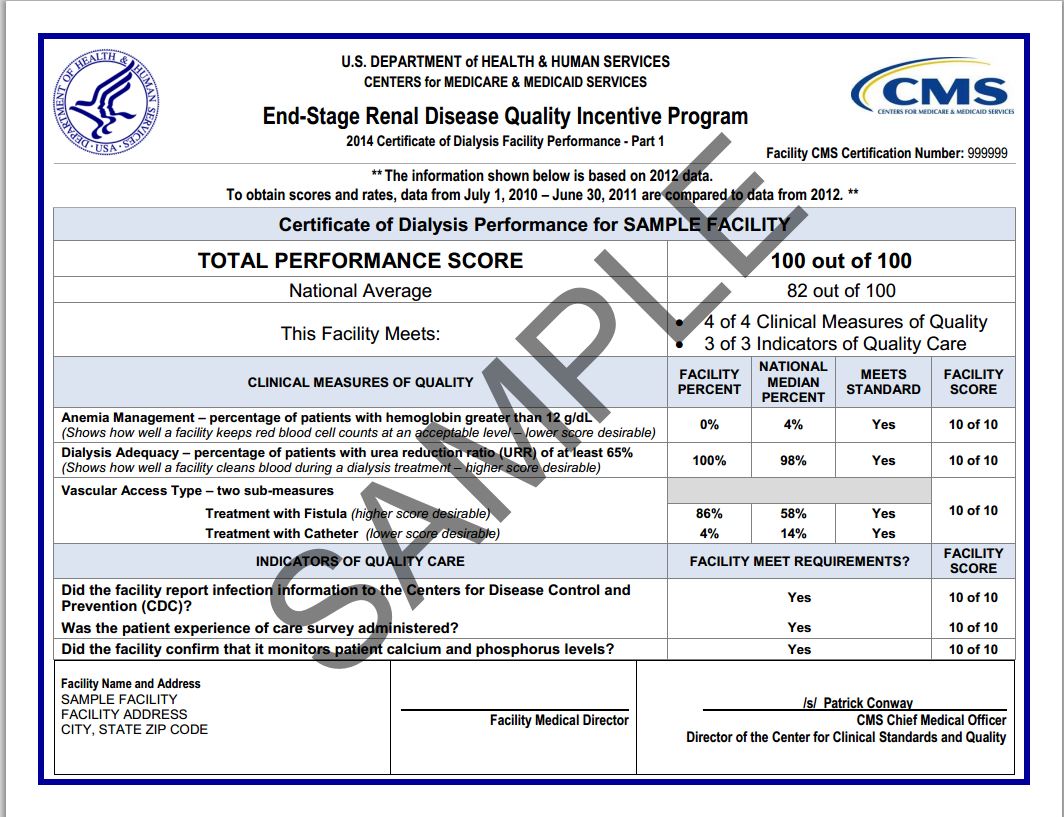Dialysis Patient Citizens News
DPC Comments on 2015 Prospective Payment System and QIP
Hon. Marilyn Tavenner, Administrator Centers for Medicare and Medicaid Services Department of Health and Human Services Hubert H. Humphrey Building 200 Independence Avenue, SW Washington, D.C. 20201 Re: CMS-1614-P: End-Stage Renal Disease Prospective Payment System, Quality Incentive Program, and Durable Medical Equipment, Prosthetics, Orthotics, and Supplies Dear Administrator Tavenner: Dialysis Patient Citizens (DPC) appreciates the opportunity to provide the Centers for Medicare and Medicaid Services (CMS) with comments on the proposed payment rule for the Medicare End Stage Renal Disease (ESRD) program. As America’s largest patient-led organization [...]
Kidney Patients Join Industry In Opposing CMS’ Dialysis Star Rating System
Kidney patients have joined the fight against the Medicare star-rating program for dialysis facilities, and they’re making the same arguments as industry. Patient advocates say that the bell curve nature of the program will confuse patients, especially those in poor areas; the program is inconsistent with the existing dialysis Quality Incentive Program; and CMS should have sought feedback from patients and providers before forcing the program on them
Dialysis Patient Citizens Critical of Dialysis Facility Compare’s Five-Star Rating System
In a letter to the Centers for Medicare & Medicaid Services’ Center for Clinical Standards and Quality, Dialysis Patient Citizens expressed concern about the implementation of Dialysis Facility Compare’s new five-star rating system.
New Medicare Rule for Dialysis Facilities Brings Changes to “Pay for Performance” Formula
Last week, the Centers for Medicare and Medicaid Services (CMS) released its Proposed Rule specifying how dialysis facilities will be paid in 2015 and beyond. Most of the proposed changes relate to the Quality Improvement Program for dialysis. The Quality Improvement Program (QIP) sets performance standards for each clinic and penalizes clinics that do not meet or make progress toward the standards by cutting their payments by up to two percent. The purpose is to incentivize providers to do a better job by tying their pay to [...]
Kidney Care Bill Introduced in U.S. House of Representatives
Congressmen John Lewis (D-GA) and Tom Marino (R-PA) have introduced the Chronic Kidney Disease Improvement in Research and Treatment Act in the U.S. House of Representatives. Lewis and Marino are leaders on the Congressional Kidney Caucus and have been staunch supporters of dialysis patients over the years. This bill seeks to advance several proactive kidney care policy initiatives and provides a vehicle for educating Members of Congress and the public about the issues facing kidney disease patients and the kidney community as a whole. The bill would: Improve [...]
Its a Shoo In!
Meet Darrel Ratliff, who continues to run his shoe repair business while also being an in-center dialysis patient. Darrel was a diabetic for many years until lab tests in 2009 revealed values his doctor did not like. He was immediately admitted to the hospital and given two dialysis treatments that day. Results of a subsequent needle biopsy determined only four percent kidney function. Darrel has struggled with many health setbacks such as anemia, infection scares and allergies. He jokingly states that he must now follow a dialysis [...]
Quality Incentive Program in July
The Center for Medicare & Medicaid Services (CMS) has an ongoing quality incentive program, the first of its kind, for End Stage Renal Disease (ESRD) care. The quality incentive program, or QIP, is intended to improve the care provided to ESRD patients by paying dialysis facilities based on the quality of care they deliver. If a facility fails to meet certain performance standards, they may receive a lower performance score, which results in lower payments to the facility. Each July, CMS releases a proposed rule with changes [...]
Kidney Community Rallies for Key Victory in Louisiana
Recently, Blue Cross Blue Shield stopped accepting third party payments for medical premiums in the new health exchanges. This meant that dialysis patients in the state of Louisiana could not use financial assistance from organizations such as the American Kidney Fund (AKF) to subsidize their premium costs. Nearly 2,000 low-income Louisiana dialysis patients rely on help from assistance organizations to maintain their access to health insurance. For people with kidney failure, the out-of-pocket treatment costs are very high, and it is particularly challenging for a person on [...]
Medicare Ambulance Fraud in Los Angeles – A Specific Example
The owners of Alpha Ambulance Inc. (Alpha), a now-defunct Los Angeles-area ambulance transportation company, have been sentenced in connection with a Medicare fraud scheme. Acting Assistant Attorney General David A. O’Neil of the Justice Department’s Criminal Division, U.S. Attorney André Birotte Jr. of the Central District of California, Special Agent in Charge Glenn R. Ferry of the Los Angeles Region of the U.S. Department of Health and Human Services Office of Inspector General (HHS-OIG) and Assistant Director in Charge Bill L. Lewis of the FBI’s Los Angeles [...]
Medicare Announces Revised ESRD Seamless Care Organization (ESCO) Program
The ESCO is based on the Accountable Care Organization model, under which providers band together to improve care and share in any savings that result from avoiding costly complications. In the case of the ESCO, the care coordination teams would consist of dialysis providers, nephrologists and any new personnel, such as nurse case managers or health coaches, brought on to assist patients. An earlier version of the ESCO, announced last year, failed to garner sufficient interest among providers. In response to input from providers and patient advocates including [...]
The Senior Medicare Patrol Program Helps Medicare Beneficiaries Prevent, Detect, and Report Health Care Fraud
By Ginny Paulson, SMP Resource Center Director Medicare loses billions each year due to fraud, error, and abuse. This not only compromises the Medicare Trust Fund, but individual beneficiaries’ future benefits and health are placed at risk as well. This problem is being addressed at many levels of government, including the nationwide Senior Medicare Patrol (SMP) program. SMPs work at the grass roots level in all 50 states plus Washington D.C., Guam, Puerto Rico, and the U.S. Virgin Islands. The SMP mission is to empower and assist Medicare [...]
Re: Support for S.B. 403
Louisiana House Insurance Committee 900 North Third Street Baton Rouge, LA 70804 Re: Support for S.B. 403 Dear Chairman Cromer and Committee, As America’s largest patient-led organization representing over 27,000 members, Dialysis Patient Citizens (DPC) works to improve the quality of life of all dialysis patients through education and advocacy. Today we are writing on behalf of the over 6,000 dialysis patients in Louisiana to support S.B. 403, which allows third-party payments for premiums. BlueCross Blue Shield of Louisiana (BCBSLA) recently instituted a new policy of no [...]
Re: Discrimination Against Dialysis Patients by BlueCross Blue Shield of Louisiana
Phyllis Borzi, Assistant Secretary Employee Benefits Security Administration Department of Labor Washington, DC John P. Albert, Director Division of Medicare Secondary Payer Policy Centers for Medicare and Medicaid Services Baltimore, MD Re: Discrimination against dialysis patients by BlueCross Blue Shield of Louisiana Dear Ms. Borzi and Mr. Albert: As America’s largest patient-led organization representing over 27,000 members, Dialysis Patient Citizens (DPC) works to improve the quality of life of all dialysis patients through education and advocacy. Today we are writing on behalf of the over 6,000 dialysis [...]
Dialysis Reimbursements Stabilized by Protecting Access to Medicare Act
This week President Obama signed the Protecting Access to Medicare Act, which contained some provisions favorable to dialysis patients. The primary purpose of the legislation was to stabilize Medicare payments to physicians, but Congress also used the opportunity to stabilize reimbursements to dialysis facilities. A large cut that had been scheduled to take effect in 2016 has been replaced by smaller, fixed-amount cuts that afford providers more certainty about revenues in coming years. This new payment formula will encourage providers to renew expiring leases on dialysis facilities and [...]
DPC Advocates Fly to Washington for 2014 World Kidney Fly-in
DPC advocates flew to Washington, DC for our 2014 World Kidney Day Fly-in. Twenty-six patients and family members were joined by 19 provider representatives from 24 states. Advocates conducted 94 meetings with Members of Congress and their staff. This year, we asked Congress to protect funding for the Medicare ESRD program and to open Medicare Part C to people on dialysis. Take a look at these pictures for the full story. The patients in the these pictures are our most active Patient Ambassadors. If you are interested in [...]
2014 World Kidney Day Fly-In
Dialysis Patient Citizens (DPC) will be hosting our annual World Kidney Day Fly-In from March 11 to March 13, 2014. Twenty-eight patients and family members from 23 states will arrive in Washington, DC to speak to nearly 100 Congressional offices about issues that affect people with kidney failure. In addition, the group will be joined by 17 dialysis facility professionals who will help amplify their message. The day prior to visiting Capitol Hill, participants will receive a comprehensive issue briefing and advocacy training from DPC staff. During this [...]
DPC Urges Administration to Keep Dialysis Accessible in Obamacare Health Plans
DPC recently urged the Department of Health and Human Services (HHS) to ensure that provider networks in new Affordable Care Act health plans offer convenient access to dialysis facilities. DPC told HHS that “since dialysis patients must typically undergo treatment three times per week, travel to and from a dialysis facility is far more burdensome than travel to physician offices or other sites of care that are visited less frequently. If a health plan limits its network to a single dialysis organization—as we fear some may do, [...]







